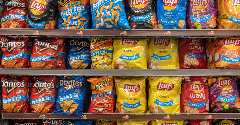News
Research addresses B12 deficiency in vegetarian diet
31 May 2018Scientists have made a significant discovery about how the vitamin content of some plants can be improved to make vegetarian and vegan diets more complete.

Scientists have made a significant discovery about how the vitamin content of some plants can be improved to make vegetarian and vegan diets more complete.
Vitamin B12 (known as cobalamin) is an essential dietary component but vegetarians are more prone to B12 deficiency as plants neither make nor require this nutrient. But now a team, led by Professor Martin Warren at the University of Kent’s School of Biosciences, has proved that common garden cress can indeed take up cobalamin.The amount of B12 absorbed by garden cress is dependent on the amount present in the growth medium, and the Kent team was able to confirm B12 uptake by showing that the nutrient ends up in the leaf.The observation that certain plants are able to absorb B12 is important as such nutrient-enriched plants could help overcome dietary limitations in countries such as India, which have a high proportion of vegetarians and may be significant as a way to address the global challenge of providing a nutrient-complete vegetarian diet, a valuable development as the world becomes increasingly meat-free due to population expansion.The Kent scientists worked with biology teachers and year 11 and 12 pupils at Sir Roger Manwood’s School in Sandwich to investigate the detection and measurement of B12 in garden cress.The pupils grew garden cress containing increasing concentrations of vitamin B12. After seven days growth, the leaves from the seedlings were removed, washed and analysed.The seedlings were found to absorb cobalamin from the growth medium and to store it in their leaves. To confirm this initial observation, the scientists at Kent then made a type of vitamin B12 that emits fluorescent light when activated by a laser. This fluorescent B12 was fed to the plants and it was found to accumulate within a specialised part of the leaf cell called a vacuole, providing definitive evidence that some plants can absorb and transport cobalamin.Vitamin B12 is unique among the vitamins because it is made only by certain bacteria and therefore has to undergo a journey to make its way into more complex multi-cellular organisms. The research described in the paper highlights how this journey can be followed using the fluorescent B12 molecules, which can also be used to help understand why some people are more prone to B12 deficiency.The discovery also has implications for combating some parasitic infections. Not only did the researchers demonstrate that some plants can absorb vitamin B12, they were also able to use the same technique to follow the movement of fluorescent B12 molecules into worms. These results demonstrate that this is a powerful model to learn about how B12 is absorbed and, as worms must use a different absorption system to mammalian systems, there is the possibility of exploiting this difference to try and treat worm-based parasites such as hook worms.Related news

PepsiCo formulates ‘naked’ Cheetos and Doritos products
31 Dec 2025
US food giant PepsiCo has launched its Simply NKD range, a move it says reimagines its popular products with new formulations free from artificial flavours, dyes, and colours.
Read more
Debate over ban on ‘meaty’ names for plant-based products reaches stalemate
26 Dec 2025
The debate over a ban on plant-based products using “meaty” terms has reached a stalemate, leaving manufacturers in limbo and still facing overhauls to their marketing and packaging.
Read more
Has ‘clean’ had its day?
22 Dec 2025
Wielding clean-label positioning and fortification as marketing levers is a dangerous strategy, and brands would be better off explaining the hows and whys of the ingredients in their products, say experts.
Read more
Bigging up bean-based products and consumption in Britain
19 Dec 2025
Non-profit organisation the Food Foundation has launched a campaign, “Bang in Some Beans”, designed to increase UK consumers’ legume consumption.
Read more
Ingredient transparency key to success in European natural health market
12 Dec 2025
Europe’s $40.7 billion supplements market is growing fast, fuelled by demand for products that support healthy ageing, mental wellbeing, and preventive health, say experts.
Read more
Sorghum emerges as better-for-you hero ingredient
9 Dec 2025
With the launch of Novak Djokovic’s sorghum-based brand, the grain’s popularity in the better-for-you snacking sphere is on the rise, thanks to its nutritional and sensory properties.
Read more
Innovation promise in 'maturing' plant-based dairy alternatives market
8 Dec 2025
Plant-based dairy is a maturing market that still faces significant hurdles around taste, functionality, nutrition, and price, but industry is innovating fast, according to experts speaking at Fi Europe.
Read more
Celebrating the winners of the Fi Europe Innovation Awards 2025
3 Dec 2025
Food industry stakeholders celebrated as the winners of the Fi Europe Innovation Awards were announced at a ceremony in Paris.
Read more
Yuka’s food scanning app helps consumers make healthier choices
2 Dec 2025
Global food scanning app Yuka helps consumers understand the content of their shopping baskets and shapes producers’ reformulation plans.
Read more
Non-UPF Program extends certification scheme to entire food industry
30 Nov 2025
The Non-UPF Program has extended its certification scheme to the wider food sector, championing a move towards healthier consumption habits.
Read more